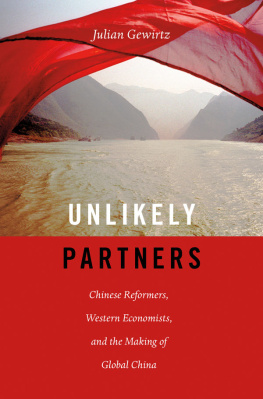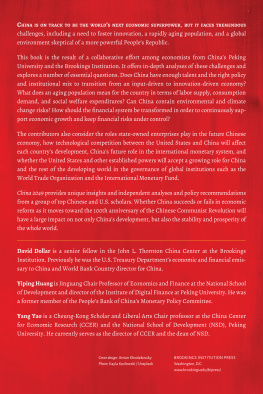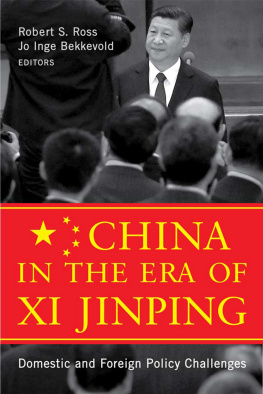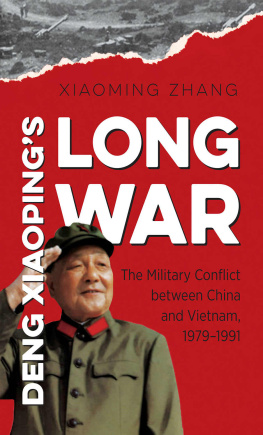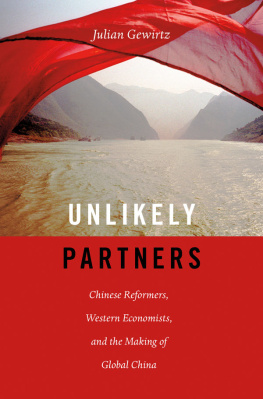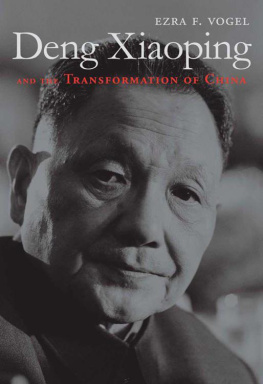Unlikely Partners
CHINESE REFORMERS, WESTERN ECONOMISTS, AND THE MAKING OF GLOBAL CHINA
Julian Gewirtz


CAMBRIDGE, MASSACHUSETTS LONDON, ENGLAND 2017
Copyright 2017 by the President and Fellows of Harvard College
All rights reserved
Cover design: Tim Jones
Cover photograph: Yangtze River, Sichuan, China 2002 Ian Berry / Magnum Photos
978-0-674-97113-4 (hard cover : alk. paper)
978-0-674-97347-3 (EPUB)
978-0-674-97346-6 (MOBI)
The Library of Congress has cataloged the printed edition as follows:
Names: Gewirtz, Julian B., 1989 author.
Title: Unlikely partners : Chinese reformers, Western economists, and the making of global China / Julian B. Gewirtz.
Description: Cambridge, Massachusetts : Harvard University Press, 2017. | Includes bibliographical references and index.
Identifiers: LCCN 2016011267
Subjects: LCSH: Economic developmentChina. | ChinaEconomic policy19762000. | ChinaEconomic policy2000 | ChinaForeign relations1976 | East and West.
Classification: LCC HC427.92 .G478 2017 | DDC 338.951dc23 LC record available at http://lccn.loc.gov/2016011267
Contents
- Introduction:
River Crossings - Conclusion:
Arrivals and Departures
CASSChinese Academy of Social SciencesCCPChinese Communist PartyCCTVChina Central TelevisionDRCDevelopment Research CenterFDIforeign direct investmentGATTGeneral Agreement on Tariffs and TradeGDPgross domestic productGNPgross national productNASNational Academy of SciencesNGOnongovernmental organizationNPCNational Peoples CongressPBOCPeoples Bank of ChinaPLAPeoples Liberation ArmyPRCPeoples Republic of ChinaRMBrenminbiSEZspecial economic zoneSPCState Planning CommissionWTOWorld Trade Organization
IN THE ERA of Deng Xiaoping, who led China during its transformation from a poor country to a global economic power, Chinas reformers often used a pithy expression to describe their method: crossing the river by feeling for the stones. The phrase is usually interpreted to mean that China would move forward through trial and error, with the precise endpoint not apparent and the pathway not known clearly in advance. But the river itself was an apt metaphor. Chinese civilization grew up along two rivers, the loess-rich Yellow River and the fast-winding Yangtze River, but it was not those rivers Chinas reformers had in mind. They meant the river as a metaphor for movement, flux, constant transformation. The crossing would itself be through currents and over flowing waters, with the markers only unseen stones. The river is a symbol of change, and crossing it would be an uncertain journey toward a changed future.
The scope of Chinas transformation over the past forty years staggers the mind. China is now the worlds largest economy by purchasing power parity and is expected to overtake the United States as the largest economy by gross domestic product (GDP) by 2025. This enormous transformation of Chinas economy and in the lives of its people since Maos death in 1976 has been shaped by a vast and important change in the way the Chinese leadership thinks about the organization of the economy. Maos communist ideology regarding the economy has been replaced. Since the early 1990s, Chinas ruling Communist Party has defined its economic system as a socialist market economy. That self-understanding is enshrined in all the Partys major ideological documents as well as in the Chinese constitution. The river China crossed to reach the socialist market economyand the stones it groped for along the way to arrive at a changed Chinais the story of this book.
A socialist market economy: Is it socialist? Is it market? How did people come to promote and accept this seeming oxymoron? How did this union of opposites actually become the official designation of the Chinese economy?
The socialist market economy is the result of Deng Xiaopings promises to make China modern, wealthy, and powerful. When Mao died, socialist China was mired in poverty and isolated from the outside world. Within two years, the feisty Deng, who stood at four feet, eleven inches and made frequent use of his personal spittoon, had replaced Maos designated successor, Hua Guofeng. After the disastrous years of the Great Leap Forward (19581961) and the Cultural Revolution, China was an economically ravaged nation of nearly one billion people, with a per capita GDP of only US$175 in 1978.
In this quest to modernize and grow the economy, Deng attached unprecedented importance to the work of Chinas economists and allowed his main economic officialPremier Zhao Ziyang, with his oversized black-rimmed glasses and graying crown of swept-back hairto encourage economic policy makers to think boldly. But as Zhao acknowledged in his posthumous memoir, My earliest understanding of how to proceed with reform was shallow and vague. I did not have any preconceived model or a systematic idea in mind.
Because Chinas leaders realized that they understood the path ahead only in a shallow and vague way, they embarked on a process of learning from abroad on a scale that has few parallels in human history. As this country of one billion people grew economically and deepened its ties with the outside world through trade and investment, its leaders also sought an extraordinary array of foreign economic ideas to help the country become a global economic powerhouse. Many participants have called this era a golden age of reform and intellectual openness. This golden age saw the end of decades of inefficient and unproductive central planning and launched China on a path to become a global power.
Under Mao, intellectual exchanges had all but ceased. Especially during the Cultural Revolution (19661976), thinkers and writerswhether economists or novelistswere often viewed as threats to the state who needed to be reeducated. Yet almost from the moment Mao died in 1976, all this changed. Economic expertise became critical to the goals of Chinas leadersand economic policy makers began what Deng called taking a look around, a casual-sounding phrase that belies the intensity of their efforts.
The experiences of countries that had experimented with transition from a socialist economy were clearly relevant, but Zhao, Deng, and other leaders urged an even wider-ranging effort. In 1978, Deng told a vice premier before a trip to Western Europe: We ought to study the successful experiences of capitalist countries and bring them back to China.
These views were highly controversial within China. Less than a decade earlier, the ultra-leftist leadership of Maos wife had insisted that economic exchanges with the West were a betrayal to the nation and she had furiously denounced worshippers of foreign things and bootlickers for foreigners. Denunciations of betrayal and bootlicking were part of a broader Mao-era program of thought-policing and maintenance of the Party line that sometimes could be a matter of life and death: tens of thousands of intellectuals and officials were purged as rightists and died during Maos rule. This discourse criticizing those who embraced foreign ideas remained a powerful line of attack even during the Deng eraand it hindered but did not stop Chinas reformers.
With unequaled granularity, significance, and scale, Chinese economists scoured the globe for the economic ideas that could help China cross the river by feeling for the stones. Invitations and delegations went out to Hungary, the United States, Japan, the United Kingdom, Yugoslavia, West Germany, and Argentina. Journeys to and from China became an integral part of crossing the riverand they, too, were river crossings of their own, voyages to lands that were sometimes strange and sometimes unexpectedly familiar.

